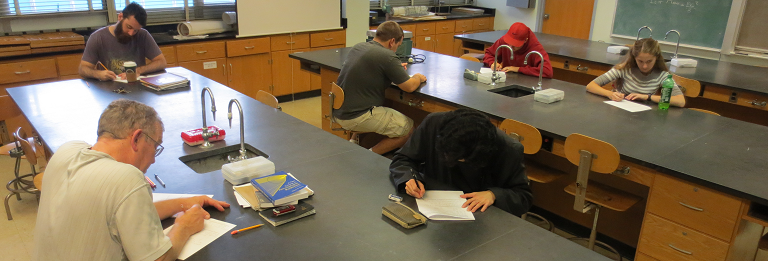Welcome to the GEOS 400, Physical Meteorology, webpage for the Fall 2012 semester.
This page will be updated every few days as the course progresses...

Physical meteorology is the study of atmospheric physics not explicitly devoted to atmospheric motions.
Physical meteorology usually treats thermodyamics, static stability, radiation, water vapor, clouds, precipitation, and sometimes touches on atmospheric optics and electricity.
(For atmospheric motions, we have GEOS 501: Dynamic Meteorology.)
Fall 2012 Lectures: MWF, 10:00 - 10:50 AM. Location: Physical Science Building 225
Syllabus (pdf)
Required Book(s):
A First Course in Atmospheric Thermodynamics by Grant W. Petty.
A First Course in Atmospheric Radiation-2nd edition by Grant W. Petty.
8/27 - Lecture: Defn. of physical meteorology, thermodynamics, system (parcel), boundary, surroundings (environment), closed systems, isolated systems.
8/29 - Lecture: Open systems, state of a system, density, specific volume, intensive and extensive properties, pressure.
8/31 - Lecture: Temperature, process, path, isothermal, isobaric, isochoric, equilibrium, Boyle's law, Charles' law.
9/03 - Labor Day. No classes.
9/05 - Lecture: Combining Charles' and Boyle's laws to derive the ideal gas law. Avogadro's law, molecular mass, mole, specific and universal gas constants.
9/07 - Lecture: Begin: Kinetic Theory of Gases.
9/10 - Quiz 1, Lecture: Finish kinetic theory of gases. Composition of dry air. Begin Dalton's law.
9/12 - Lecture: Finish Dalton's law; calculation of the mean molecular mass of dry air and the dry air gas constant.
9/14 - Lecture: Finish dry air gas constant; work done by an expanding gas; Begin heat capacity.
9/17 - Quiz 2. Lecture: Specific heat capacities at constant pressure and constant volume; First law of thermodynamics.
9/19 - Lecture: Diabatic and adiabatic processes; Poisson's Equation, potential temperature.
9/21 - Lecture: Compressibility of gas vs liquid; derive hydrostatic eqn. and barometric law; vertical profiles of P and density.
9/24 - Quiz 3. Lecture: Environmental vs parcel lapse rate; derive dry adiabatic lapse rate.
9/26 - Lecture: Derive autoconvective lapse rate; parcel theory.
9/28 - Lecture: Static stability: unstable, neutral, stable.
10/01 - Quiz 4. Lecture: Derive Brunt-Väisälä frequency.
10/03 - Lecture: Static stability and Brunt-Väisälä frequency.
10/05 - Exam #1.
10/08 - Lecture: Begin water vapor. Phases, phase change, vapor pressure, saturation vapor pressure.
10/10 - Hand out copies of A Field Guide to the Atmosphere. Lecture: Latent heats, mixing ratio, derive virtual temperature.
10/12 - Lecture: Virtual temperature, specific humidity, relative humidity, formula for saturation vapor pressure, dew point.
10/15 - Quiz #5. Lecture: Discuss specific heats for moist air. Begin derivation for saturated pseudoadiabatic lapse rate.
10/17 - Lecture: Complete derivation for saturated pseudoadiabatic lapse rate. Hand out Skew-T diagrams. Begin thermodynamic diagrams.
10/19 - Lecture: Continue discussion of thermodynamic diagrams; begin discussion of Clausius–Clapeyron equation.
10/22 - Quiz #6. Lecture: Continue discussion of Clausius–Clapeyron equation; formulation of saturation vapor pressure as function of T; mixing fog.
10/24 - Lecture: PVT diagram for ideal gas; Thermodynamic surfaces for pure substances; critical point; triple point, Remarkable properties of water.
10/26 - Special Lecture: Lidar.
10/29 - Special Lecture: Lidar. Hand out copies of
A First Course in Atmospheric Radiation-2nd edition.
10/31 - Lecture: Wet-bulb temperature; lifting condensation level (LCL); hydrometeors.
11/02 - Lecture: Observations of the LCL, supersaturation, nucleation, CCN, supercooled droplets, cloud phases. Begin radiation. Total solar irradiance.
11/05 - Quiz #7. Lecture: Solar constant; Planck's function, Wein's displacement law; Stefan-Boltzman law; solar and terrestrial emission spectra.
11/07 - Lecture: Albedo, emissivity, absorptivity, Begin global energy budget.
11/09 - Lecture: Continue global energy budget with and without dry atmosphere.
11/12 - Veterans Day. No classes.
11/14 - Lecture: Continue global energy budget: include effect of evaporation from surface and condensation in atmosphere. Define and discuss feedbacks.
11/16 - Exam #2. Programming assignment due.
11/19 - Thanksgiving. No classes.
11/21 - Thanksgiving. No classes.
11/23 - Thanksgiving. No classes.
11/26 - Lecture: Absorption spectra of greenhouse gases; trends in GHG concentration and evidence of global warming.
11/28 - Lecture: Attenuation, extinction, scattering, absorption, Beer's Law, absorption coefficient, absorption cross-section, optical depth.
11/30 - Lecture: Finish differential form of Beer's law. Optical depth, radiative forcing, climate sensitivity parameter, direct effect, indirect effect.
12/03 - Dr. Mayor at AGU. Students prepare for review week presentations.
12/05 - Dr. Mayor at AGU. Students prepare for review week presentations.
12/07 - Dr. Mayor at AGU. Students prepare for review week presentations.
12/10 - Review week. 20 minute presentations from Thomas Coots and Blair Bracewell.
12/12 - Review week. 20 minute presentations from Tyson Randall and Masaki Hamada.
12/14 - Review week. 20 minute presentations from James Schafer and Carleene Busse.
12/19 - Comprehensive final exam: Wednesday, 10:00 – 11:50 AM, PHSC 225
Dr. Mayor's page
CSU Chico Atmospheric Lidar Research Group
This page updated 9/26/2012.
